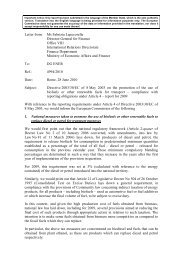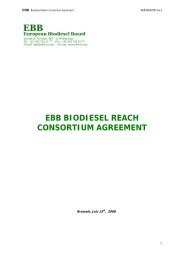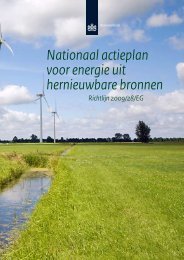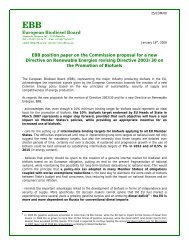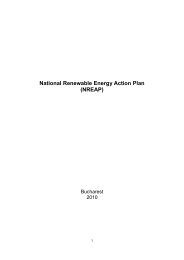EBB - European Biodiesel Board
EBB - European Biodiesel Board
EBB - European Biodiesel Board
You also want an ePaper? Increase the reach of your titles
YUMPU automatically turns print PDFs into web optimized ePapers that Google loves.
445/PRO/07 <strong>EBB</strong> REPLY to public consultation of DG TREN, April-May 2007<br />
technology: it is not because a technology is not available today but may be available tomorrow that it<br />
should be automatically preferred to the existing ones. Equally it is not because a technology employs a<br />
particular kind of raw material that it should be preferred to others.<br />
Therefore it has to be defined on the basis of objective, demonstrable criteria as set out in answer<br />
3.1c.<br />
Question 3.1.a:<br />
Should the definition be based on the type of raw materials from which biofuels are made<br />
(for example, "biofuel from cellulosic material")?<br />
As indicated above, a raw material based definition would certainly lead to unfair discrimination among<br />
the different biofuels. This can be explained through various examples:<br />
- Ethanol from sugar cane does not have, by definition, a better GHG balance and a more<br />
interesting environmental impact than ethanol from other raw materials. It can be the case only<br />
if it is processed by using the by-products of sugar cane (bagasse) in order to create the energy<br />
necessary for the processing. However bio-ethanol can also be produced from sugar cane<br />
without burning the bagasse. Similarly, biodiesel (FAME) can be produced by employing one or<br />
more of its by-products (the meals from oilseeds crushing and/or the glycerine) to feed the<br />
process. If both by-products are employed the GHG of FAME improves very significantly.<br />
However: under a raw materials based definition even if all of its by-products are used for<br />
creating the energy necessary to the processing of FAME, the consequent important GHG savings<br />
would not be rewarded or taken into account for further encouraging this kind of production<br />
since FAME would be disqualified by using vegetable oils as a raw material, which would be a<br />
clear nonsense<br />
- FAME and NexBtl (Hydro-diesel) technology employ the same raw material, but are different<br />
technologies with different GHG and environmental impacts. Why should they be considered<br />
automatically at the same level only because they employ the same raw materials?<br />
Question 3.1.b:<br />
Should the definition be based on the type of technology used to produce the biofuel (for<br />
example, "biofuels produced using a production technique that is capable of handling<br />
cellulosic material")?<br />
A technology based definition would equally represent an unacceptable mistake. Obviously a technology<br />
change cannot represent an objective by itself (not all change is innovative), in fact:<br />
- <strong>Biodiesel</strong> (FAME) production from used fried oils (UFOs) and animal waste/animal fats, being<br />
produced from a recycled product that would be burnt anyhow or dispersed in the environment<br />
has a very positive GHG balance and has no impact on land use. Research conducted by various<br />
research institutes 16 confirm such important advantages, highlighting that FAME produced from<br />
such raw materials also represent a very feasible option for replacing fossil diesel. Now: under a<br />
technology based definition FAME from UFOs and animal fats would be excluded from the list of<br />
the “preferred biofuels”, and this would clearly represent an unfair discrimination.<br />
- Research is being conducted today on biodiesel (FAME) production from algae. This can also<br />
entail very high CO² cuts, avoiding land use, exploiting instead sea water (the largest globally<br />
available resource), possibly even using waste sea water and purifying it with algae growth.<br />
Again: under a technology based definition FAME from algae would be excluded from the list of<br />
the “preferred biofuels” and this would clearly represent another unjustified discrimination.<br />
Question 3.1.c:<br />
16 The German IFEU-Institute has realised a study on this topic: http://www.ufop.de/downloads/Co2_neutrale_Wege.pdf<br />
- 11 -



